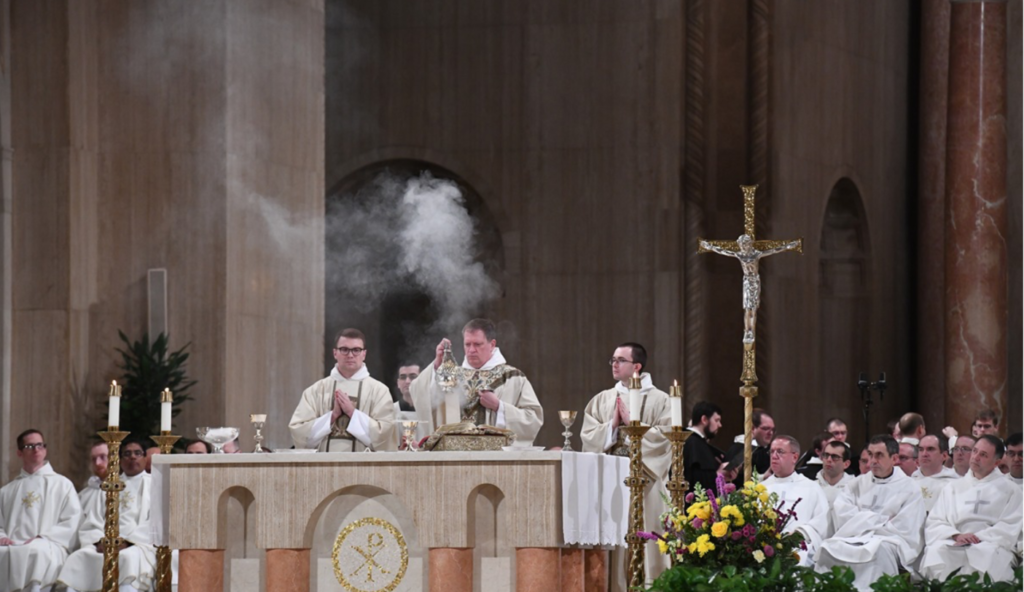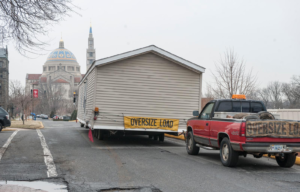CUA and DHS Celebrate the Mass for the Feast of St. Thomas Aquinas in the Basilica

Image Courtesy of the Catholic University of America
By Zachary Lichter
The Catholic University of America (CUA) community came together in the Basilica of the National Shrine of the Immaculate Conception on January 25 to celebrate the university’s patron, St. Thomas Aquinas.
St. Thomas Aquinas was an Italian Dominican friar from the thirteenth century who was known for being a scholar, theologian, and philosopher. He is known for writing the Summa Theologiae, in which he expressed his views on theology and philosophy. In 1323, St. Thomas Aquinas was canonized, and in 1567, he was officially named a “doctor of the church.”
Gabriel Radich, a junior math major, said why he believes people should celebrate the Feast of St. Thomas Aquinas.
“The nature of the feast lies in the subject, the person that the feast is celebrating,” Radich said. “No man or woman ever has or ever will love the Lord and contribute to the mission of the Church in the way that St. Thomas did.”
Michael Bellacicco, a junior mechanical engineering major, gave his reasons for why people should attend the Mass.
“The Mass for the Feast of Saint Thomas is an opportunity for students to come together in order to take part in the celebration in the Source and Summit of the Christian life (the Eucharist),” Bellacicco said. “As we begin a new semester as college students, we ask for the intercession of St. Thomas. God wants to lavish His grace on us, and the Mass is a great way in which we can enter into a greater relationship with Him.”
Classes were canceled between 11:45 a.m. and 3:00 p.m. so faculty, staff, and students could attend the Mass, which began at 12:10 p.m. in the Upper Church of the Basilica.
Father Allen Moran was the main celebrant and homilist for the Mass. As the Prior Provincial of the Dominican Province of St. Joseph, he overlooks all the Dominican monasteries in that Province. Two transitional deacons, Deacon Cornelius Avaritt and Deacon Cyril Stola, assisted Father Allen.
There were also 54 concelebrating priests in attendance. The concelebrants included Monsignor Ronny Jenkins, Dean of the School of Canon Law; Father Gladstone “Bud” Stevens, Rector of the Theological College; Father Carter Griffin, Rector of the St. John Paul II Seminary; Father Antonio López, Provost and Associate Professor of Theology; Pontifical John Paul II Institute for Studies on Marriage and the Family; and Father Aquinas Guilbeau, University Chaplain and Vice President of Ministry and Mission. Five transitional deacons also attended, processing with Father Allen and the concelebrants.
Mass began with a welcoming address from CUA’s President, Peter Kilpatrick, followed by Margaret Kaplow, Communications Manager of the National Catholic Education Association, reading the Epistle Reading from the Book of Wisdom (Ws. 7: 7-10, 15-16). Brother Louis Bethea from the Schola then sang the Responsorial Psalm (Ps. 37: 3-4, 5-6, 30-31) and the Gospel Acclamation. Deacon Cyril read from the Gospel of Matthew (Mt. 5: 13-19).
In his homily, Father Allen said that January 25 is traditionally celebrated as the feast of St. Paul’s conversion, which St. Thomas Aquinas calls a “miraculous event” in two different ways. The first was that God was acting when he came upon Saul (later known as the Apostle Paul), and the conversion was immediate since the light was shining on him. The second was how he learned the light of truth.
Father Allen also explained that not all conversions are miraculous. God uses people as instruments in order to bring about a partial conversion, and gradually, as charity and grace grow, the human person becomes more perfect.
Furthermore, he noted implications for Catholic education in a person’s apostolic activity. First, teachers like the effects of their teachings to be immediate and perfect, just like the conversion of St. Paul. This can be achieved by being patient while teaching and while learning. Second, there is confidence in the power of truth. People can learn from the light of truth by learning about the greatness of God through the study of human nature and physical objects. Third is the indispensable need for revelation. Father Allen said that St. Thomas Aquinas lays this notion out in the Summa Theologiae and some of his other theological and philosophical works. He finished the homily by saying that we all require the fate of everyone’s knowledge to pass on the ability to know where true happiness lies.
At the end of Mass, President Kilpatrick said in his closing address that people should think about the sacred gift of friendship, which St. Thomas Aquinas wrote about in his Summa Theologiae. To Aquinas, good friends believe and comfort one another. They come out of themselves to each other without counting the cost. Not only should people seek warm, heartfelt friendship from one another, but they should also be givers of that friendship. He finished by saying that everyone should express gratefulness for their friendships this semester, as everyone should help each other in their pursuit of sanctification.
After Father Allen gave a blessing, the congregation then parted ways.






